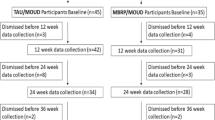Abstract
The effectiveness of Mindfulness-Based Relapse Prevention (MBRP) in a naturalistic outpatient setting for those in recovery from opioid use disorder receiving medication-assisted treatment is unknown. The purpose of this pilot study was to test the effectiveness of MBRP in a naturalistic outpatient setting for those in recovery from opioid use disorder. Participants were recruited from a comprehensive opioid addiction treatment program who were in the intermediate stage of medication-assisted treatment (MAT) (at least 90 consecutive days substance free). Participants who completed the MBRP intervention served as their own controls [i.e., each participant participated in 8 weeks of treatment-as-usual (TAU) with MAT before the 8-week MBRP was initiated]. Pre/post-data analysis with study completers and non-completers (i.e., participants who did not complete the mindfulness intervention, but remained in TAU) was performed. Thirty-two participants were recruited (mean age, 36; range 21–47). No significant differences in baseline demographics were detected between the completers and non-completers. Analyses suggest significant reductions (p < 0.05) were observed in reported depression in completers compared to non-completers, and significant increases were observed in reported mindfulness (p < 0.05) in completers among those completed the MBRP intervention study phase. Trends in the hypothesized direction were also observed for anxiety (p = 0.17), but not for craving (p = 0.43). Although significant attrition was experienced, results suggest MBRP can be incorporated into a MAT in an outpatient setting, and significant positive findings were observed despite the small sample size. An unexpected finding was that patients in MAT still reported clinically significant levels of anxiety and depression that were not reduced in TAU.

Similar content being viewed by others
References
Baer, R. A., Smith, G. T., Hopkins, J., Krietemeyer, J., & Toney, L. (2006). Using self-report assessment methods to explore facets of mindfulness. Assessment, 13, 27–45.
Bentley, K. H., Gallagher, M. W., Carl, J. R., & Barlow, D. H. (2014). Development and validation of the Overall Depression Severity and Impairment Scale. Psychological Assessment, 26(3), 815–830.
Bowen, S., Chawla, N., Collins, S., Witkiewitz, K., Hsu, S., Grow, J., Clifasefi, S., Garner, M., Douglass, A., Larimer, M., & Marlatt, A. (2009). Mindfulness-based relapse prevention for substance use disorders: a pilot efficacy trial. Substance Abuse, 30, 205–305.
Bowen, S., Witkiewitz, K., Clifasefi, S. L., Grow, G., Chawla, N., Hsu, S. H., Carroll, H. A., Harrop, E., Collins, S. E., Lustyk, M. K., & Larimer, M. E. (2014). Relative efficacy of mindfulness-based relapse prevention, standard relapse prevention, and treatment as usual for substance use disorders: a randomized clinical trial. JAMA Psychiatry, 71(5), 547–556.
Campbell-Sills, L., Norman, S. B., Craske, M. G., Sullivan, G., Lang, A. J., Chavira, D. A., Bystritsky, A., Sherbourne, C., Roy-Byrne, P., & Stein, M. B. (2009). Validation of a brief measure of anxiety-related severity and impairment: the Overall Anxiety Severity and Impairment Scale (OASIS). Journal of Affective Disorders, 112(1–3), 92–101.
Center for Behavioral Health Statistics and Quality. (2015). Behavioral health trends in the United States: results from the 2014 National Survey on Drug Use and Health (HHS) Publication No. SMA 15-4927, NSDUH Series H-50. http://www.samhsa.gov/data/. Accessed 22 December 2016.
Centers for Disease Control and Prevention (CDC), National Center for Health Statistics.Multiple Cause of Death 1999–2014 on CDC WONDER Online. Database. (2015). Data are from the multiple cause of death files, 1999–2014, as compiled from data provided by the 57 vital statistics jurisdictions through the vital statistics cooperative program. http://wonder.cdc.gov/mcd-icd10.html. Accessed 4 January 2017.
Eisendrath, S. J., Gillung, E., Delucchi, K. L., Segal, Z. V., Nelson, J. C., McInnes, L. A., Mathalon, D. H., & Feldman, M. D. (2016). A randomized controlled trial of mindfulness-based cognitive therapy for treatment-resistant depression. Psychotherapie Psychosomatik, medizinische, Psychologie, 85(2), 99–110.
Ferszt, G. G., Miller, R. J., Hickey, J. E., Maull, F., & Crisp, K. (2015). The impact of a mindfulness based program on perceived stress, anxiety, depression and sleep of incarcerated women. International Journal of Environmental. Research and Public Health, 12(9), 11594–11607.
Finney, J. W., & Moos, R. H. (1992). The long-term course of treated alcoholism, II: predictors and correlates of 10-year functioning and mortality. Journal of Studies on Alcohol, 53, 142–153.
Franken, I. H. A., Hendriks, V. M., & van den Brink, W. (2002). Initial validation of two opiate craving questionnaires: the obsessive compulsive drug use scale and the desires for drug questionnaire. Addictive Behaviors, 27(5), 675–685.
Gwilliam, M. (2013). West Virginia behavioral health epidemiological profile. Charleston: West Virginia Department of Health and Human Resources, Bureau for Behavioral Health and Health Facilities, Division on Alcoholism and Drug Abuse.
Hofmann, S. G., Sawyer, A. T., Witt, A. A., & Oh, D. (2010). The effect of mindfulness-based therapy on anxiety and depression: a meta-analytic review. Journal of Consulting and Clinical Psychology, 78(2), 169–183.
Hubbard, R. L., Craddock, G., Flynn, P. M., Anderson, J., & Etheridge, R. (1997). Overview of 1-year follow-up outcomes in the drug abuse treatment outcome study (DATOS). Psychology of Addictive Behaviors, 11, 261–278.
Levi, J., Segal, L. M., & Martin, A. (2015). The facts hurt: a state-by-state injury prevention policy report. Trust for Americas Health and the Robert Wood Johnson Foundation.
Mattick, R.P., Breen C., Kimber, J., & Davoli M. (2014). Buprenorphine maintenance versus placebo or methadone maintenance for opioid dependence. Cochrane Database of Systematic Reviews, 2, No. CD002207.
McLellan, A. T., & McKay, J. (1998). The treatment of addiction: what can research offer practice? In S. Lamb, M. Greenlick, & D. McCarty (Eds.), Bridging the gap: forging new partnerships in community-based drug abuse treatment. Washington, DC: National Academy Press.
Norman, S. B., Cissell, S. H., Means-Christensen, A. J., & Stein, M. B. (2006). Development and validation of an overall anxiety severity and impairment scale (OASIS). Depression and Anxiety, 23(4), 245–249.
Penberthy, J. K., Konig, A., Gioia, C. J., Rodríguez, V. M., Starr, J. A., Meese, W., Worthington-Stoneman, D., Kersting, K., & Natanya, E. (2015). Mindfulness-based relapse prevention: history, mechanisms of action, and effects. Mindfulness, 6(2), 151–158.
Serpa, J. G., Taylor, S. L., & Tillisch, K. (2014). Mindfulness-based stress reduction (MBRS) reduces anxiety, depression and suicidal ideation in veterans. Medical Care, 52(12, Suppl 5), S19–S24.
Sobell, L. C., & Sobell, M. B. (1996). Timeline Followback user’s guide: a calendar method for assessing alcohol and drug use. Toronto: Addiction Research Foundation.
Timko, C., Schultz, N. R., Cucciare, M. A., Vittorio, L., & Garrison-Diehn, C. (2016). Retention in medication-assisted treatment for opiate dependence: a systematic review. Journal of Addictive Diseases, 35(1), 22–35.
Witkiewitz, K., & Bowen, S. (2010). Depression, craving and substance use following a randomized trial of mindfulness-based relapse prevention. Journal of Consulting and Clinical Psychology, 78, 362–374.
Witkiewitz, K., Bowen, S., Douglas, H., & Hsu, S. H. (2013). Mindfulness-based relapse prevention for substance craving. Addictive Behaviors, 38(2), 1563–1571.
Woody, G. E., Bruce, D., Korthuis, P. T., Chhatre, S., Poole, S., Hillhouse, M., Jacobs, P., Sorensen, J., Saxon, A. J., Metzger, D., & Ling, W. (2014). HIV risk reduction with buprenorphine-naloxone or methadone: findings from a randomized trial. Journal of Acquired Immune Deficiency Syndromes, 66(3), 288–293.
Acknowledgements
Supported/provided by internal funding from West Virginia University Department of Behavioral Medicine and Psychiatry.
Author information
Authors and Affiliations
Contributions
KJZ led all aspects of the study, including writing of the article, and data analyses. LRL helped conceive the study, led study recruitment efforts, and provided input into the article. SS coordinated study recruitment and data collection efforts and provided input into the article. MRB co-led MBRP sessions with participants and edited and provided input into the article. GRH provided statistical support and input into the article. LF co-led MBRP sessions with participants and provided input into the article.
Corresponding author
Ethics declarations
Conflict of Interest
The authors declare that they have no conflicts of interest.
Rights and permissions
About this article
Cite this article
Zullig, K.J., Lander, L.R., Sloan, S. et al. Mindfulness-Based Relapse Prevention with Individuals Receiving Medication-Assisted Outpatient Treatment for Opioid Use Disorder. Mindfulness 9, 423–429 (2018). https://doi.org/10.1007/s12671-017-0784-0
Published:
Issue Date:
DOI: https://doi.org/10.1007/s12671-017-0784-0




